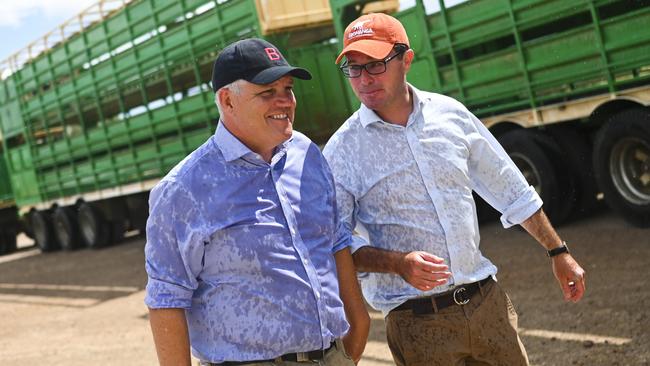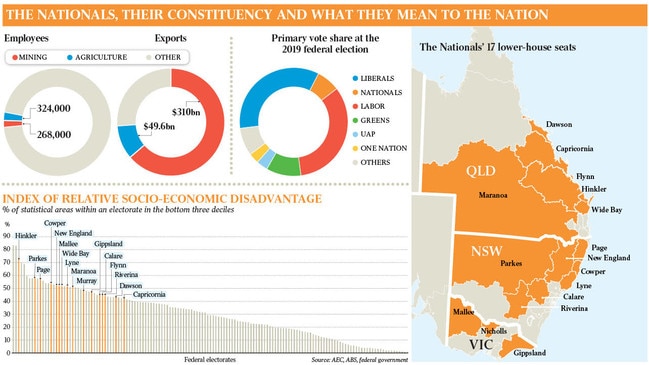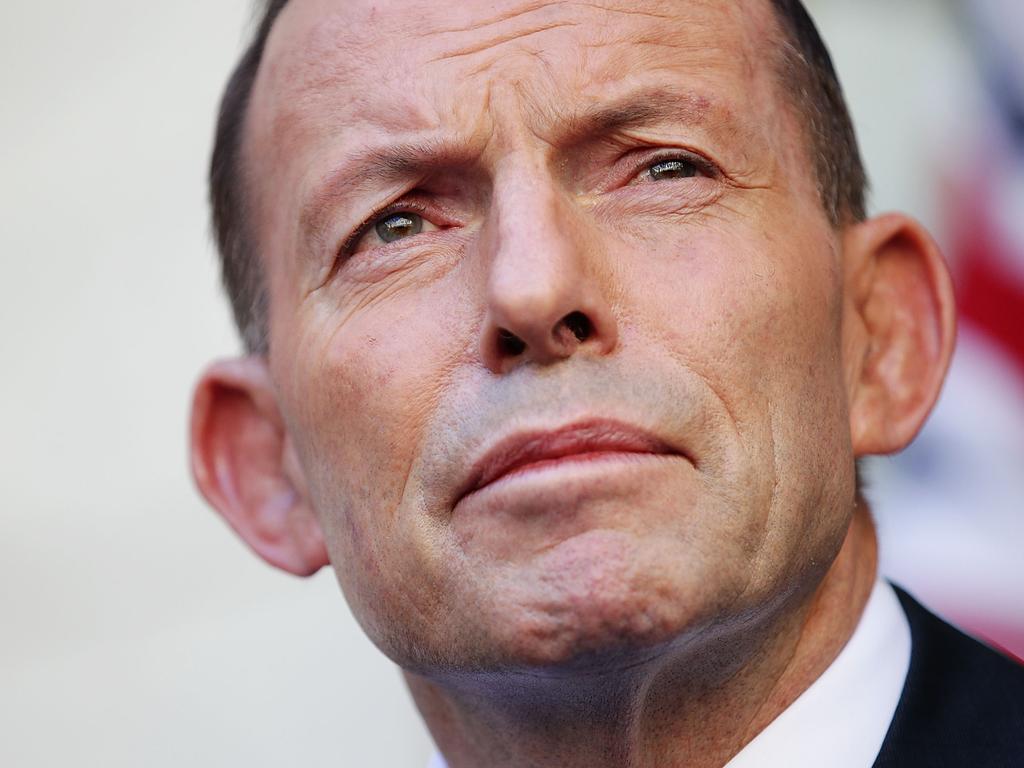Farmers’ champion urges cities to see the light on climate
Agriculture Minister David Littleproud urges climate policy empathy for farmers.

Agriculture Minister David Littleproud desperately wants city dwellers to understand the plight of farmers facing new climate change policy burdens and to recognise the role of rural Australia in feeding and clothing those same city people.
But, the minister says, if those city slickers can’t see how farmers care for their landscape and must keep costs down and, instead, offer only “self-satisfied criticism”, then they can “just bugger off”.
“The people in metropolitan areas need to understand the links between rural producers and their own lives so they can be fed and watered,” the minister told The Weekend Australian after weeks of debate about committing to a net-zero carbon emissions target for 2050.
”It’s not just the people in rural Australia who will pay a price if agricultural production of sustainable food and fibre is impinged upon, the people in the cities pay a price too. Previously the ability to produce sustainable food and fibre has been impinged upon without compensation. If the capacity and capability to produce food and fibre is disrupted that is a national security issue,” he said, after references this week to regional security threats from rising sea levels and climate change.
“There is an intrinsic tie between farm health and profit and production, and city people need to understand that, rather than delivering self-satisfied criticism from 1000 kilometres away.
“If they don’t understand those links and the importance of farming for their lives, they can just bugger off.”
Resources Minister and fellow Queensland National Keith Pitt is equally blunt about media commentators, foreign corporations and UN officials telling the Nationals and Australia to abandon coal by 2030.
“Recently we had a United Nations Special Adviser followed by a group of London-based academics telling us we have to close down our coal industry by 2030 or we’ll carry the responsibility of the planet overheating,” Mr Pitt told The Weekend Australian.
“Let’s look first at what’s at stake. Australia’s coal industry directly employs over 50,000 Australians and supports the jobs of another 300,000.
“It generates around $50bn in exports, which translates to billions of dollars in taxes for state and federal governments.
“The men and women of the Australian coalmining industry deserve our support for the contribution they’re making to our national economic success.
“Their future will be determined by the policies of the elected Australian government, not foreign organisations and academic groups.”

Defence Minister Peter Dutton, who represents Dickson on Brisbane’s northern fringe, backed the Nationals’ right to have a strong say in negotiations about Australia’s emissions-reduction policy.
“I don’t think it’s going to cost us any more than respect for the Nationals that they wanted, that they deserve, and we’ve allowed them to go through a process,” the Liberal frontbencher said.
“They’re going to continue that on Sunday. But they represent regional Australia and, as we discussed last week, if you’re turning up to work in a fluoro vest today, in a mining town in central Queensland, you want to know the federal government and the state government is supporting you, not closing you down.
“We’re not proposing for you and I who live in a capital city that there is going to be any change to our life. You and I, people living in capital cities, might, you know, be able to afford an increase in our electricity costs; in regional areas and in lower-income households, they can’t. So we’ve got to get the balance right. That’s what we’re doing.”
Labor climate change spokesman Chris Bowen this week dismissed Nationals’ claims that they were defending rural and regional Australians from “woke city slickers”. “The entire premise of the Coalition’s very public fight is that the Nationals are defending regional Australia from the woke green agenda of city slickers. Nothing could be further from the truth,” Mr Bowen told a climate change conference on Thursday.
“Regional Australia is most exposed to climate change – whether that’s environmental impacts like bushfires, or transition risks like carbon tariffs on regional commodities,” he said.
After two weeks of intense negotiations, public splits and being accused of being an irrelevant rural rump or a tail wagging the Coalition dog Nationals ministers and MPs are fighting for the right to defend their constituencies and political future.
As Scott Morrison considers the Nationals’ proposals to counter the adverse impacts of a commitment to net-zero carbon emissions by 2050 on farm and resources workers in rural and regional areas, the Nationals are already preparing for the 2022 election campaign.
In the 2016 election, the Nationals saved Malcolm Turnbull from defeat after he lost 14 seats, holding every one of theirs and even picking one up from the Liberals. In 2019 it was Nationals campaigning in Queensland for mining against Green activists that created the “miracle victory” for the Coalition.
The Nationals are the “junior” Coalition partner in government but their political contribution is disproportionate to their numbers: at the last election 953,083 people cast a lower house primary vote for a Nationals candidate. Of the 16 House of Representatives seats the Nationals won, six had more than 50 per cent of the primary vote; one in six Coalition votes was cast for a Nationals candidate and Nationals seats cover 21 per cent of Australia’s landmass, including 59 per cent of NSW, Victoria and Queensland.
All of the Nationals’ seats are within the 42 electorates deemed most disadvantaged and the vast majority of the nation’s 268,000 miners and 324,000 agricultural workers live in Nationals seats. Mine workers contributed to exports of $310bn and the farm workers $49.6bn in exports. Nationals seats represent some of the poorest Australians and richest ventures.
Former resources minister Matt Canavan said: “The National Party is the new home of the hi-vis and blue-collar worker. No one else is representing these people, and everything we decide should consider how it affects them.”
Mr Littleproud also argues the Nationals “are really the last line of defence for rural and regional Australia”.
“My electorate is three times the size of Victoria and those people are entitled to be heard, and not just for their own sake but for the sake of the people in the metropolitan areas and the economy,” he said. “It’s not just the feeding and clothing of Australia. Look at the agricultural figures: as a nation of about 26 million we produce enough food to feed 80 million and our exports are heading to $70bn.”
Mr Littleproud wants city dwellers to think of the rump steak that comes from farmers, not the Nationals as a rural rump.
Mr Pitt said Australia’s coal was important for developing nations to move their people out of poverty and to ensure reliable power when renewables come under pressure.
“Recently, it’s been revealed that New Zealand is importing a record amount of thermal coal to cover shortfalls from its hydro and gas-generated power,” he said.
“Ironically, a country portrayed as an international poster child for the ‘clean and green’ economy is using more coal than at any time in the past 13 years to guarantee its electricity supply.”







To join the conversation, please log in. Don't have an account? Register
Join the conversation, you are commenting as Logout